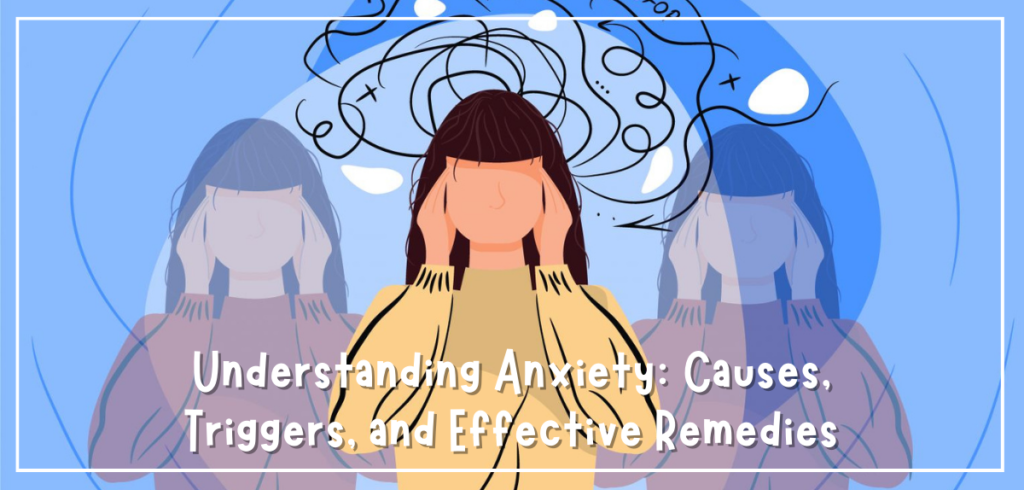Anxiety is a common mental health condition that affects millions of people worldwide. It can manifest in various forms, from generalized anxiety disorder to specific phobias, and can have a significant impact on an individual’s daily life. In this blog, we’ll explore the causes and triggers of anxiety and discuss effective remedies and strategies to manage it.
Understanding the Causes of Anxiety
Anxiety is a complex condition with multiple causes, including:
Biological Factors: Genetics plays a role in anxiety. If you have a family history of anxiety disorders, you may be more susceptible.
Brain Chemistry: Imbalances in neurotransmitters like serotonin and dopamine can contribute to anxiety.
Environmental Factors: Stressful life events such as trauma, abuse, or major life changes can trigger anxiety. Chronic stress from work, relationships, or financial problems can also be a contributing factor.
Personality and Temperament: Some individuals are naturally more prone to anxiety due to their personality traits. Perfectionism, neuroticism, or a tendency to overthink can increase vulnerability.
Medical Conditions: Certain medical conditions, such as thyroid disorders or chronic pain, can exacerbate anxiety symptoms.
Substance Use: Alcohol, drugs, and even excessive caffeine can worsen anxiety.
Understanding what triggers your anxiety is a crucial step in managing it. Common anxiety triggers include:
Stress: High-stress levels at work, in relationships, or due to personal issues can exacerbate anxiety.
Trauma: Past traumatic experiences, such as abuse, accidents, or loss, can lead to anxiety disorders.
Health Concerns: Worrying about health problems, either real or perceived, can be a significant trigger.
Social Situations: Social anxiety is triggered by fear of judgment, criticism, or embarrassment in social interactions.
Phobias: Specific phobias, such as fear of heights, flying, or spiders, can induce intense anxiety.
Life Transitions: Major life changes, like moving, starting a new job, or ending a relationship, can be anxiety-inducing.
Effective Remedies for Anxiety
While anxiety can be overwhelming, there are effective strategies to manage and alleviate its symptoms:
Therapy: Cognitive-behavioral therapy (CBT), exposure therapy, and talk therapy can help you understand and cope with anxiety triggers.
Medication: In some cases, medication prescribed by a healthcare professional can help manage anxiety symptoms.
Lifestyle Changes: Regular exercise, a balanced diet, and sufficient sleep can contribute to better mental health.
Stress Management: Techniques like mindfulness, yoga, and meditation can reduce stress and anxiety.
Breathing Exercises: Practicing deep breathing techniques can calm the nervous system during anxiety attacks.
Social Support: Confide in friends and family, and consider joining a support group to share your experiences and coping strategies.
Avoiding Triggers: Identify and minimize exposure to situations or substances that trigger your anxiety.
Limiting Caffeine and Alcohol: Reducing or eliminating caffeine and alcohol consumption can help manage anxiety.
Relaxation Techniques: Engage in activities you find relaxing, such as reading, listening to music, or taking a warm bath.
Professional Help: If anxiety is severely affecting your life, consult a mental health professional for guidance and treatment options.
It’s important to remember that managing anxiety is a journey, and what works best can vary from person to person. Seeking professional help when needed is a crucial step, as a mental health expert can tailor treatment to your specific needs.
In conclusion, anxiety is a complex condition with multiple causes and triggers. Understanding these factors is the first step in effectively managing anxiety. With the right strategies, support, and professional guidance, individuals can learn to cope with anxiety and lead healthier, more fulfilling lives. Remember, you’re not alone in your journey, and there is help available to overcome anxiety and regain control of your well-being.

